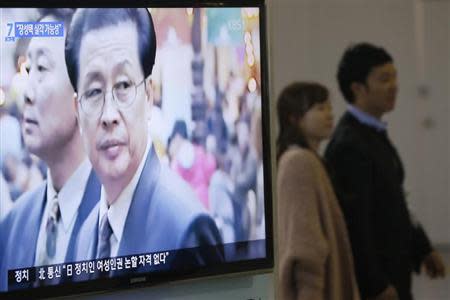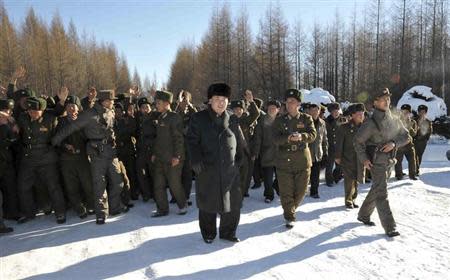Perhaps one purge too many for power behind North Korean throne
By Jack Kim and James Pearson SEOUL (Reuters) - The man considered the power behind the throne in secretive North Korea is believed to be out of a job, thanks to his nephew and leader Kim Jong Un, and it wasn't immediately clear if this time he can find the way back. Jang Song Thaek survived purges and official displeasure to reach the pinnacle of his career, thanks largely to his sometimes tempestuous marriage to Kim Kyong Hui, the 67-year-old daughter of North Korea's founder, Kim Il Sung. The Pyongyang power couple formed a kind of regency in the obscurantist political world of the North behind Kim Jong Un, its young and mercurial leader, who succeeded his father, Kim Jong Il, in December 2011. "The most important thing for Jang Song Thaek is he has institutional memory - he knows where all the bodies are buried and that's critical in North Korea," said Mike Madden, a North Korea expert and author of NK Leadership Watch blog. "He knows who has a drinking problem, and whose wife likes to talk to her relatives a little too much." The couple's reach was augmented by their control over the ruling Korean Workers' Party's secret funds that handle the Kim family's finances both at home and abroad, according to An Chan Il, a former North Korean military officer who defected to the South and has become an expert on the North's power elite. After his dismissal in 2004, Jang, 67, was rehabilitated to stand at the peak of power as Vice Chairman of the National Defence Commission, the country's top military body, and was a member of the ruling Workers' Party Politburo. He has likely been sacked from both posts, according to South Korean lawmaker Jung Cheong-rae, who on Tuesday cited a senior South Korean official with the National Intelligence Service (NIS). "Jang is both the greatest benefactor and the greatest threat (to Kim Jong Un)", said Park Hyeong-jung at the state-run Korea Institute of National Unification in Seoul back in April. Jang met Kim Kyong Hui when they were students at Kim Il Sung University. He had good looks and charm, was popular and outgoing, known more for partying and deftness with the accordion than his academic achievements, according to Hwang Jang-yop, a former Workers' Party secretary and defector who was head of the school at the time. PARTIES AND WOMEN His humble background made Jang a less than ideal suitor for the headstrong daughter of North Korea's founder. Yet Kim Kyong Hui did not let her father's objections stop her from marrying - with the help of her brother, according to Jang Jin Song, a North Korean defector who previously worked at the Workers' Party United Front Department, a propaganda unit tasked with destabilising South Korea. The marriage was not a happy one, he said. As Jang Song Thaek started rising through the ranks of the Workers' Party, he became less attentive to his family. It was an open secret that he partied hard and womanised, said defectors in Seoul and South Korean politicians who met Jang on a 2002 visit as part of an economic delegation touring the South's industrial successes. Their daughter, Kum-song, died in an apparent suicide while attending school in France, ironically because her parents objected to her boyfriend, according to Jang Jin Song. Kim Kyong Hui herself had an affair with a young pianist who taught her daughter, according to Jang Jin Song, who recalled that a classmate of his at the Pyongyang University of Music and Dance had been a rival for Kim's affections. The piano teacher, a former child prodigy and household name, and who was 10 years younger than his paramour, would soon disappear. Kim Kyong Hui would be told he had committed suicide. But Jang the defector said Kim knew her husband had had her lover killed, one of a vast number of people to fall victim to a reign of terror Jang Song Thaek orchestrated in the late 1990s. Before he became the power behind the throne under Kim Jong Un, Jang was ejected from the elite in 2004 for angering Kim Jong Il by hosting lavish parties, according to media reports and assessments by South Korean think-tanks. Two years later, he was back, and in 2011 was widely credited with orchestrating the ouster of Army chief of staff Ri Yong Ho, a major rival who had been a loyal aide to the father of Pyongyang's current leader. Jang's removal, if final, could mean Kim Jong Un has lost perhaps the strongest benefactor he could have to help his transformation into a ruler of the calibre of his predecessors, a factor that leaves the question of his future return open. "Jang's a big potato to get rid of," said Madden of NK Leadership Watch. "They can't get rid of him completely. If they do, they're in trouble because this is the guy you do not want going to a foreign country. "... Jang is basically a Kim Jong Il figure. Kim Jong Un does not have the intellectual capacity to do what his father did. His father was really in touch with a lot of things that Kim Jong Un is not." (Editing by Nick Macfie)


